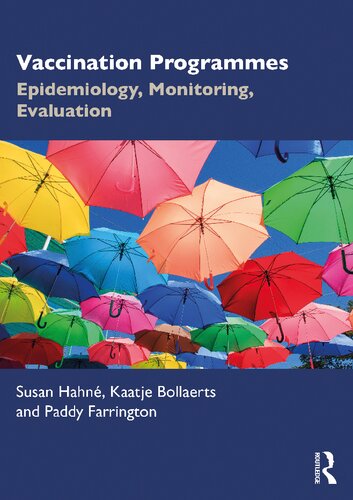

Most ebook files are in PDF format, so you can easily read them using various software such as Foxit Reader or directly on the Google Chrome browser.
Some ebook files are released by publishers in other formats such as .awz, .mobi, .epub, .fb2, etc. You may need to install specific software to read these formats on mobile/PC, such as Calibre.
Please read the tutorial at this link: https://ebookbell.com/faq
We offer FREE conversion to the popular formats you request; however, this may take some time. Therefore, right after payment, please email us, and we will try to provide the service as quickly as possible.
For some exceptional file formats or broken links (if any), please refrain from opening any disputes. Instead, email us first, and we will try to assist within a maximum of 6 hours.
EbookBell Team

4.7
106 reviewsVaccination programmes are of vital importance to public health and are present in virtually every country in the world. By promoting an understanding of the diverse effects of vaccination programmes, this textbook discusses how epidemiologic methods can be used to study, in real life, their impacts, benefits and risks.
Written by expert practitioners in an accessible and concise style, this book is interspersed with practical examples which allow readers to acquire understanding through real-life data and problems. Part I provides an overview of basic concepts in vaccinology, immunology, vaccination programmes, infectious disease transmission dynamics, the various impacts of vaccination programmes and their societal context. Part II covers the main field tools used for the epidemiological evaluation of vaccination programmes: monitoring coverage and attitudes towards vaccination, surveillance of vaccine-preventable diseases and pathogens, seroepidemiological studies, methods to assess impact and outbreak investigation. Part III is dedicated to vaccine effectiveness and its assessment. Part IV includes an overview of the potential risks of vaccination and how to study these. Lastly, Part V deals with methods for an integrated assessment of benefits and risks of vaccination programmes. Suitable for professionals working in public health, epidemiology, biology and those working in health economics and vaccine development, Vaccination Programmes also serves as a textbook for postgraduate students in public health, epidemiology and infectious diseases.
The book is aimed at all those involved in the many aspects of vaccination programmes, including public health professionals and epidemiologists. Its primary target audiences are master and doctoral students in infectious disease epidemiology and public health, post-doctoral participants of field epidemiology training programmes and public health professionals working in the post-implementation epidemiological evaluation of vaccines and vaccination programmes.